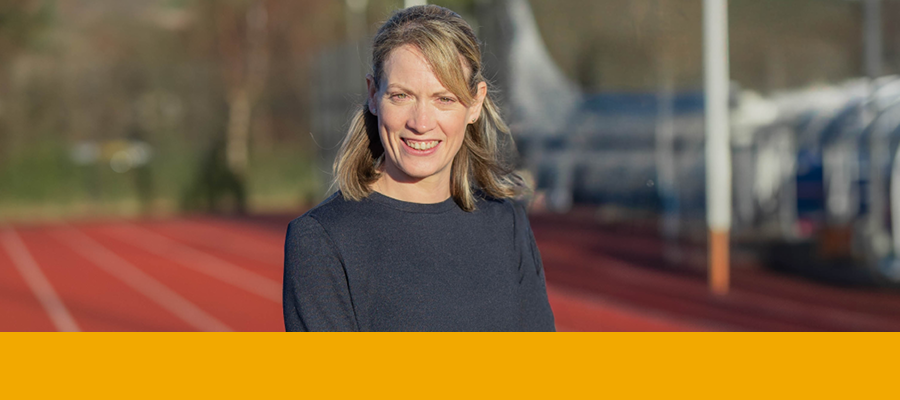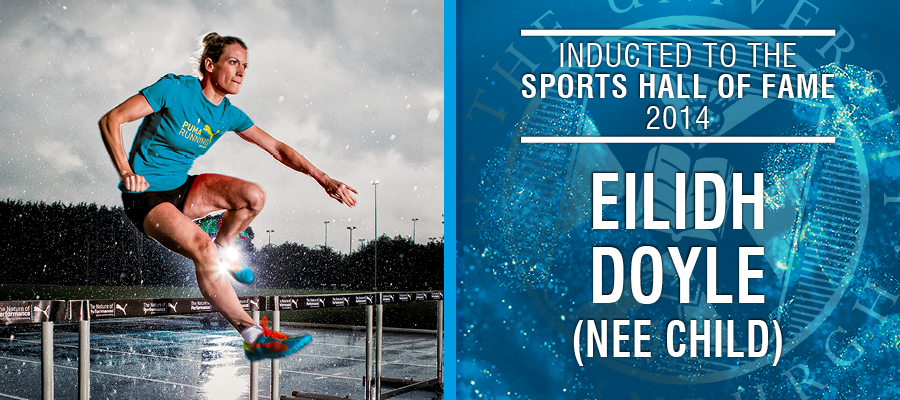From the track to team mentor

Eilidh Doyle is one of Scotland’s most decorated athletes — a three-time Olympian, European champion, and Commonwealth Games medallist. But beyond the medals and records, she’s known for her leadership, empathy, and passion for supporting the next generation. Now serving as a Sports Ambassador at her former university, Eilidh is continuing to inspire young athletes to find joy and purpose in sport.
In this exclusive Q&A, Eilidh reflects on the most meaningful moments of her career, the mentors who shaped her, and the lessons she’s carrying forward as she supports student athletes today.
Looking back over your athletics career, which moments stand out as the most significant or meaningful to you?
For me, the most meaningful moments weren’t necessarily about medals or times — they were the ones that reflected trust and respect from my peers.
In 2017, I was named captain of the British Athletics team for the World Championships in London. What made it so special was that, for the first time, the team chose the captain themselves. It wasn’t a coach or director — it was a vote from my teammates. That meant the world to me.
And then in 2018, I carried the flag for Scotland at the opening ceremony of the Commonwealth Games. Again, that was voted for by my teammates — and it was the first time a female athlete had done so at an opening ceremony for Team Scotland. Those moments were incredibly emotional and proud ones in my career.
Was there a particular coach or training moment that made you realise success in sport was truly possible for you?
I’ve had four main coaches over my career, and they all played important roles at different stages. But the most significant was probably Malcolm Arnold. I joined him in 2010 and worked with him through to the 2016 Rio Olympics — the peak of my career.
Malcolm had coached world and Olympic champions and was known as a real hurdles guru. What I loved about him was his no-nonsense attitude. He didn’t hand out praise easily — you had to earn it. But that suited me. I liked just turning up, working hard, and letting the results speak for themselves. When he did say “well done,” it meant a lot. He really instilled that consistent work ethic in me.
You’ve spoken before about the importance of mentorship. What lessons from your early years have stayed with you?
Mentors are so important, especially ones who’ve actually been there. Coaches and performance directors are vital, but mentorship often goes beyond the professional relationship — it’s someone who can sit down and say, “Here’s what I went through,” and really relate to what you’re experiencing.
That kind of honesty and shared experience is powerful. As a mentor now, I try to offer that. Even if someone’s journey is different from mine, I can at least say, “I know what it felt like to be in a similar situation.” That kind of connection can make someone feel less alone.
What role did your time at university play in shaping your approach to sport and leadership?
University was a turning point. I started at 17 — still young — and before then, sport had always been relatively easy. My parents took me to training, everything was organised. But suddenly, it was all on me. I had to get myself to training, manage my own nutrition, recovery, time… everything.
It was the moment I realised how much I wanted it. I understood that if I wanted to keep improving, I had to take full accountability for every aspect of my lifestyle. That period made me a lot more serious about my athletics, and it shaped how I approached the rest of my career.
You’ve been honoured as a team captain and flag bearer — how did those moments compare to winning medals?
They were honestly some of the proudest moments of my life. And they weren’t things I ever dreamed of achieving. You grow up aiming for teams, medals, times — not thinking about being a captain or carrying a flag.
But when those things happened, they had a massive emotional impact. I’ll never forget it. When I retired, I asked my parents what stood out to them from my career. My mum said, “Carrying the flag for Scotland,” and my dad said, “Your lap of honour at Hampden.” Not medals — those moments. That said it all.
Being chosen by your teammates… there’s no higher compliment.

Eilidh was also inducted into the University’s Sports Hall of Fame in 2014.
How did university shape you personally, not just as an athlete?
I think, at first, I tried to blend in. I was a young fresher and wanted to be part of the social scene, so I didn’t lead with my identity as an athlete. But as time went on, I realised that athletics was something I valued deeply about myself. I stopped hiding it and embraced it more fully.
So, university helped me discover not just how much my sport meant to me — but also who I was and who I wanted to be.
Now that you’re a Sports Ambassador for the university, what do you hope to bring to that role? What advice would you offer student athletes today?
My goal is simple: to make life easier for student athletes. I want to be someone they can talk to, who’s been through it and can share advice or just listen. University life is such a big transition — new city, new coaches, new social circles. Just having someone who gets it can make a huge difference.
My advice? Be organised, and be honest with yourself about what you can manage. You can’t do everything at 100% all the time. Learn when to ease off, when to push, and how to keep things in balance. Burnout is real, and trying to be a top-class student and athlete without structure will catch up with you. It’s all about balance.
You’re now active in promoting sport to young people. Why is that so important to you?
Sport gave me so much more than medals. It gave me friends, life skills, confidence, resilience, independence. It taught me how to win — and how to lose. All of that stays with you for life.
I think we sometimes undervalue sport unless it leads to elite performance, but that’s not the point. The real benefits — teamwork, discipline, joy — are things every young person deserves to experience.
I’d encourage every young person to just find something they enjoy, get involved, and be active. You don’t need to be aiming for the Olympics for it to be worthwhile.
What’s next for you? How do you see your role in sport evolving in the years ahead?
With my youngest starting nursery, I’ll have more time — so I’m hoping to take on more projects and expand the work I’m already doing. I’d love to develop the ambassador role at the university further, working more closely with student athlete groups.
I’m continuing my work with the Youth Sport Trust and looking to reach more schools. And of course, I’m always excited to be around live sport — hopefully I’ll be involved in some way when the Commonwealth Games return to Glasgow.
I just love being part of the sporting world. Whether that’s mentoring, supporting, or cheering from the sidelines — it’s something I’ll always want to be involved in.
Sir Chris Hoy Sports Scholarship Fund
If you would like more information on how to support some of our next incredible students athletes, please consider the new Sir Chris Hoy Sports Scholarship Fund. Named after one of our most inspirational sporting alumni, this fund supports elite student athletes who are pursuing success in their academic and athletic endeavours.
Support the Sir Chris Hoy Sports Scholarship Fund
Related links

